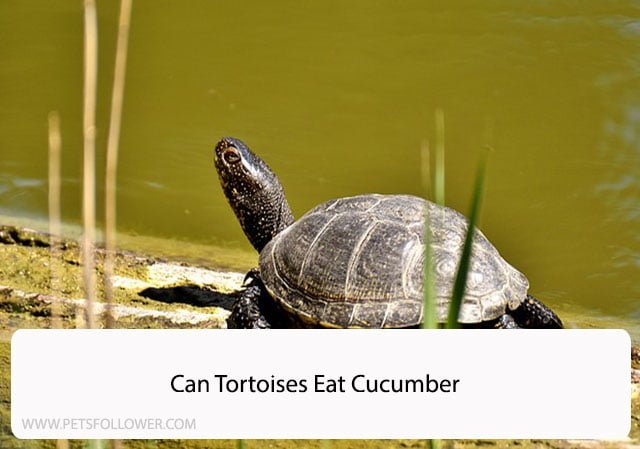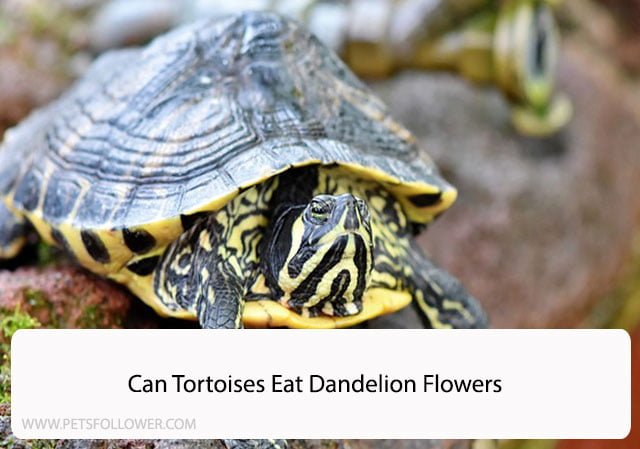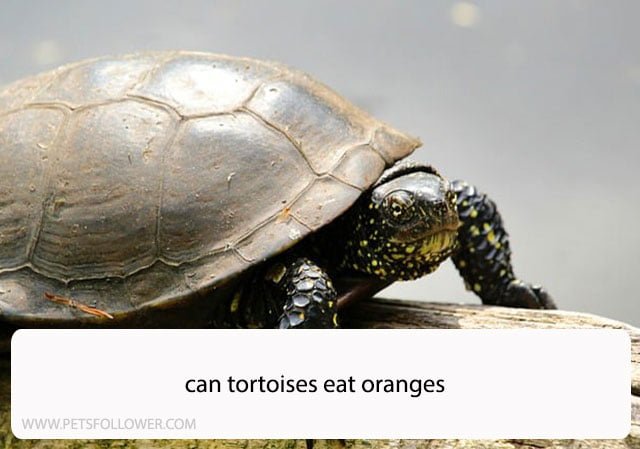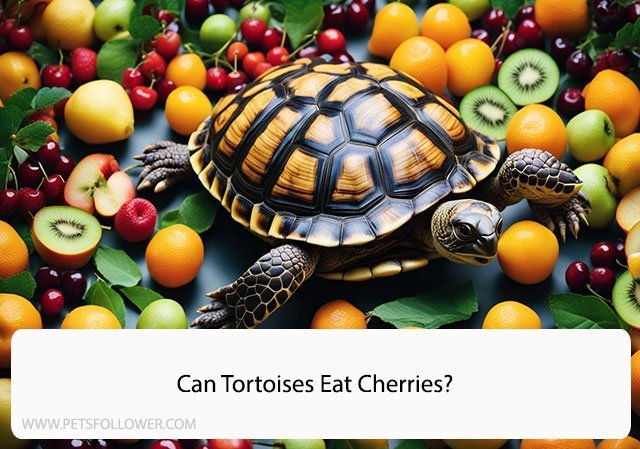Tortoises are herbivorous animals that enjoy a variety of plants and vegetables in their diet. As a result, many pet owners wonder if it is safe to feed their tortoise aloe vera. Aloe vera is a succulent plant that is often used for medicinal purposes and is known for its healing properties. In this article, we will explore whether tortoises can eat aloe vera and if it is safe for them to do so.
Aloe vera is a popular plant that is often used in skincare products and as a natural remedy for various ailments. While it may be safe for humans to consume aloe vera in small amounts, it is important to consider whether it is safe for tortoises to eat. As tortoises have a different digestive system than humans, it is important to understand how aloe vera may affect them before feeding it to them. In this article, we will provide information on the nutritional benefits of aloe vera, as well as any potential risks associated with feeding it to tortoises.
Tortoise Dietary Habits

Tortoises are herbivores, which means that their diet primarily consists of plant-based foods. They are known to consume a variety of vegetables, fruits, and leafy greens. Generally, tortoises enjoy eating plants that are high in fiber and low in protein.
It is important to note that different species of tortoises have different dietary requirements. For example, some tortoises require a higher amount of calcium in their diet than others. Therefore, it is essential to research the specific dietary needs of your tortoise before feeding them anything new.
When it comes to aloe vera, it is not a typical food item in a tortoise’s diet. While aloe vera is not toxic to tortoises, it is not recommended as a regular part of their diet. Aloe vera contains a laxative effect that can cause diarrhea if consumed in large quantities.
In conclusion, tortoises have specific dietary requirements that should be met to ensure their health and well-being. While aloe vera is not toxic to tortoises, it is not recommended as a regular part of their diet due to its laxative effect.
Aloe Vera Nutritional Profile

Aloe vera is a succulent plant that is known for its medicinal properties. It is commonly used in skincare products, but can also be consumed for its nutritional benefits. In this section, we will discuss the nutritional profile of aloe vera.
Aloe vera is low in calories, with only 36 calories per 100 grams. It is also low in fat and protein, but high in carbohydrates. Aloe vera contains a variety of vitamins and minerals, including:
- Vitamin C
- Vitamin E
- Vitamin B12
- Folic acid
- Calcium
- Magnesium
- Zinc
Aloe vera also contains several beneficial plant compounds, including:
- Anthraquinones
- Flavonoids
- Tannins
These compounds have been shown to have anti-inflammatory and antioxidant properties.
One of the most notable compounds in aloe vera is acemannan. This polysaccharide has been shown to have immune-boosting properties and may also have anti-cancer effects.
Overall, aloe vera is a nutrient-dense plant that can provide a variety of health benefits. However, it is important to note that aloe vera should be consumed in moderation and should not be used as a replacement for a balanced diet.
Effects of Aloe Vera on Tortoises
Aloe vera is a succulent plant that is commonly used in various products for its medicinal properties. As tortoise owners, we may wonder if it is safe to feed our pets aloe vera. In this section, we will discuss the effects of aloe vera on tortoises.
Digestive System
Aloe vera contains a compound called aloin, which has laxative properties. While this may be beneficial for humans, it can be harmful to tortoises. Ingesting too much aloin can cause diarrhea, dehydration, and electrolyte imbalances in tortoises. Therefore, it is not recommended to feed aloe vera to tortoises, especially in large quantities.
Skin and Shell Health
Aloe vera is known for its ability to soothe and heal skin irritations. However, applying aloe vera to a tortoise’s skin or shell can do more harm than good. Aloe vera contains enzymes that can break down proteins, which can damage the keratin in a tortoise’s shell. Additionally, aloe vera can cause skin irritation and allergic reactions in some tortoises.
In conclusion, while aloe vera may have some benefits for humans, it is not recommended to feed it to tortoises or apply it to their skin or shell. The potential risks outweigh the benefits, and there are safer alternatives available for maintaining a tortoise’s health.
Precautions When Feeding Aloe Vera to Tortoises
When it comes to feeding aloe vera to tortoises, there are a few precautions that we need to keep in mind. While aloe vera can provide some benefits to tortoises, it can also have adverse effects if not given in moderation.
Firstly, it is important to note that not all species of tortoises can consume aloe vera. Some species may have a more sensitive digestive system and may not be able to tolerate aloe vera. Therefore, it is recommended to consult with a veterinarian who specializes in reptiles before feeding aloe vera to your tortoise.
Secondly, the gel inside the aloe vera plant contains a compound called aloin, which can cause diarrhea and dehydration if consumed in large quantities. Therefore, it is important to only feed small amounts of aloe vera to your tortoise and monitor their reaction.
Lastly, it is important to ensure that the aloe vera plant has not been treated with any pesticides or chemicals. These chemicals can be harmful to your tortoise and can cause adverse reactions.
In summary, while aloe vera can provide some benefits to tortoises, it is important to take precautions and feed it in moderation. Always consult with a veterinarian before feeding aloe vera to your tortoise, only feed small amounts, and ensure that the plant has not been treated with any harmful chemicals.
Alternative Foods for Tortoises
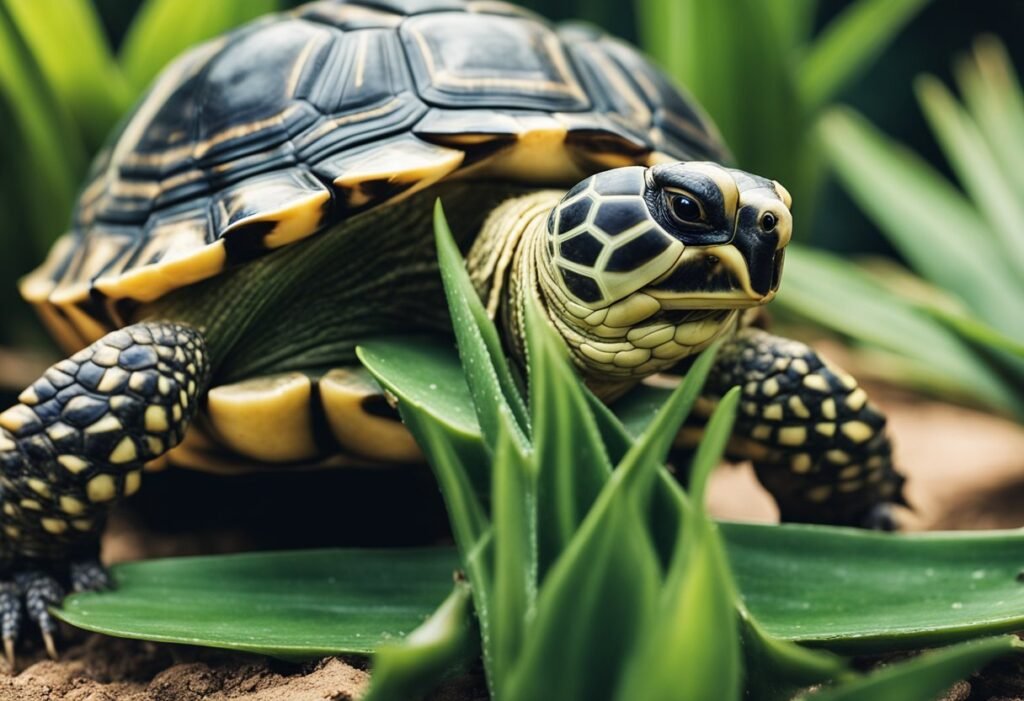
As we know, tortoises are herbivores and require a diet that is rich in fiber and low in protein. While their primary diet should consist of leafy greens and vegetables, there are some alternative foods that can be added to their diet for variety and additional nutrients.
One such food is cactus pads, also known as nopales. They are a good source of fiber, calcium, and vitamins A and C. However, it is important to remove the thorns and spines before feeding them to your tortoise.
Another alternative food is hibiscus flowers, which are high in antioxidants and vitamin C. They also contain calcium and iron. Make sure to remove the stamen and pistil before feeding them to your tortoise.
Pumpkin and squash are also good options for tortoises. They are high in fiber and contain vitamins A and C. However, they should be fed in moderation as they are high in sugar.
In addition to these foods, there are also commercial tortoise diets available that can provide a balanced mix of nutrients. However, it is important to read the ingredients and ensure that they do not contain any harmful additives or preservatives.
Overall, while a tortoise’s diet should primarily consist of leafy greens and vegetables, adding alternative foods can provide variety and additional nutrients. As always, it is important to consult with a veterinarian before making any significant changes to your tortoise’s diet.
Frequently Asked Questions

What plants are safe for tortoises to eat?
Tortoises are herbivores and require a diet that is high in fiber and low in protein. Some safe plants for tortoises to eat include dandelions, clover, and plantain. It is important to research each plant before feeding it to your tortoise to ensure it is safe.
Can Sulcata tortoises consume aloe vera?
Sulcata tortoises should not consume aloe vera as it can be toxic to them. Aloe vera contains a compound called aloin, which can cause diarrhea and dehydration in tortoises.
Is aloe vera toxic to tortoises?
Aloe vera can be toxic to tortoises if consumed in large amounts. It contains aloin, which can cause diarrhea, dehydration, and other digestive issues. It is best to avoid feeding aloe vera to your tortoise.
How much aloe vera should I feed my tortoise?
You should not feed aloe vera to your tortoise. It is important to provide them with a balanced diet that includes a variety of safe plants.
Can tortoises eat cacti?
Some species of tortoises can eat cacti, but it is important to research the specific type of cactus before feeding it to your tortoise. Some cacti can be toxic and cause digestive issues.
What are some safe succulents for tortoises to eat?
Some safe succulents for tortoises to eat include hens and chicks, sedum, and echeveria. As with any plant, it is important to research each succulent before feeding it to your tortoise to ensure it is safe.



